SALTISE 2018 Annual Conference Highlights
Just prior to the summer break, hundreds of educators interested in active learning gathered for the 2018 SALTISE annual conference, which was hosted this year at McGill University. The diverse range of presentations led by guest speakers from around the globe did not disappoint, keeping attendees engaged for the entire day. What follows are some highlights from members of Profweb Editorial Team who were on hand for this year’s conference.
Off to a great start
The conference theme for 2018 was Disruptive Innovations: Changing Educational Landscapes. The day began with lively informal discussions with familiar faces from across the college network, just prior to the official start of the conference. To get the conference under way, SALTISE Co-director Dr. Elizabeth Charles welcomed attendees to the 2018 edition in a large lecture theatre at the McGill Medical building.
The morning keynote was a strong start to the conference with an interactive presentation led by Richard M. Felder from North Carolina State University and Rebecca Brent from Education Designs, Inc. They delivered a thoughtful and interactive talk on Understanding and minimizing resistance to learner-centred teaching. In active learning, the teacher needs not only to deliver content, but to monitor students. Since the student takes on a greater role in their learning than in a traditional lecture, resistance can and often does occur.
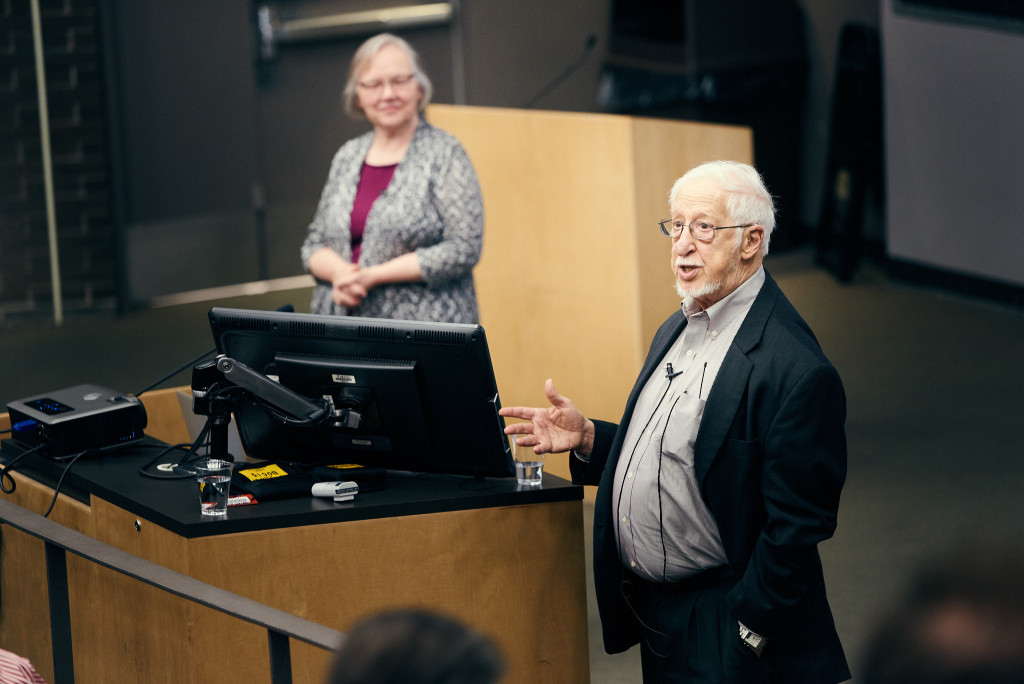
Rebecca Brent and Richard M. Felder address the attendees during the opening keynote session (Photo copyright Tom Berthelot).
It was fascinating to see how Felder and Brent moderated discussions in such a large theatre setting, where one-to-one contact with learners was not feasible. The presenters would cover some content, and then would ask questions and invite the attendees to discuss with their neighbours. Attendees were then encouraged to share their answers with the group, with tailored commentary provided by the presenters afterwards. This type of interaction helps the lecturers to “know where the bumps in the roads are for students” according to Felder and Brent.
They encouraged attendees to persevere when trying learner-centred teaching (LCT). In their opinion, LCT is effective, since it results in better attitudes, higher motivation, greater learning and skill development.
Finally, Felder and Brent left attendees with some sage advice. They encouraged attendees not to try too much, too soon, but to learn about LCT and ease in, gradually, while also giving students the sense that you care about their learning from Day 1!
A summary of their presentation is available here.
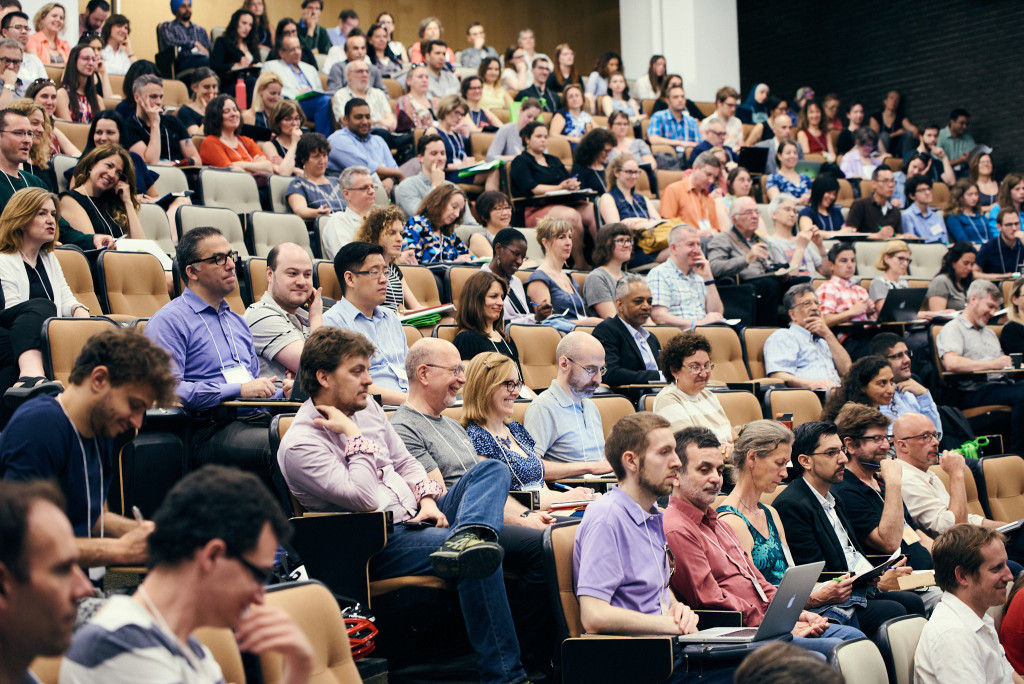
The SALTISE 2018 Conference was a well-attended event that was appreciated by many stakeholders from higher education in Quebec (Photo copyright Tom Berthelot).
Morning workshops
The morning workshops were divided into 2 periods with thematic blocks of micro-presentations that kept attendees involved into the early part of the afternoon.
The block entitled Engaging the Learning: Supporting Thinking and Learning covered diverse topics like e-Portfolios, environmental education, and a new technology-assisted lab report writing platform called OCLaRE. As part of this block, conference attendees packed into room ED 211 of McGill’s Faculty of Education building to hear Kelly Miller from Harvard University’s talk Increasing the Effectiveness of Active Learning Using Deliberate Practice: A Homework Transformation.
Miller conducted a 3-year transformation process for an Introduction to Physics course that she teaches. Year 1 was a baseline year with traditional lecturing and assignments. The course pass rate was 70 %. In year 2, Miller moved from lectures to active learning, where students were assigned Physics problems to solve in a group. Miller likened the process to how she learned rowing, with the motion of rowing broken down into component parts, which were learned through deliberate practice and then assembled into the whole motion of rowing. In year 3, the nature of the assignments changed. Where students were traditionally assigned 5 to 7 complex exam-like questions with no feedback, now they were assigned a series of about 30 questions on Physics subskills with targeted feedback. In year 3, the course pass rate grew to 82 % with little change in the time investment for students.
The presenters of the Online and Web-based Learning block explained how they engaged their students through the use of various digital technologies. Whether they were using myDALITE a web-based tool designed on the principles of peer instruction or Inno-moti-vation a website with pedagogical scenarios using the Web 2.0, the classroom experiences that they shared combined the best of online learning and face-to-face instruction.
Interlude
Finishing up the 2nd workshop block at close to 1 p.m., the SALTISE conference organizers thoughtfully provided ample time at lunch for attendees to grab a bite, network with colleagues, visit education industry-related exhibitor booths and check out a poster session that was organized by students. As it was a beautiful, sunny day in Montreal, many attendees opted to take their boxed lunch outside to dine with colleagues and enjoy the spectacular views of the McGill campus and the downtown skyline.
Before moving into the afternoon keynote, the 2018 SALTISE Best Practices & Pedagogical Innovators Awards were presented to Claire Trottier of McGill University and Louis Normand from the College de Rosemont for their leadership in the implementation of active learning approaches in their respective establishments. A lifetime achievement award from SALTISE was granted to Thérèse Laferrière, from the Université Laval for her inspiring work during her career. She is currently the director of CRIRES, a multi-university research center on successful schooling.
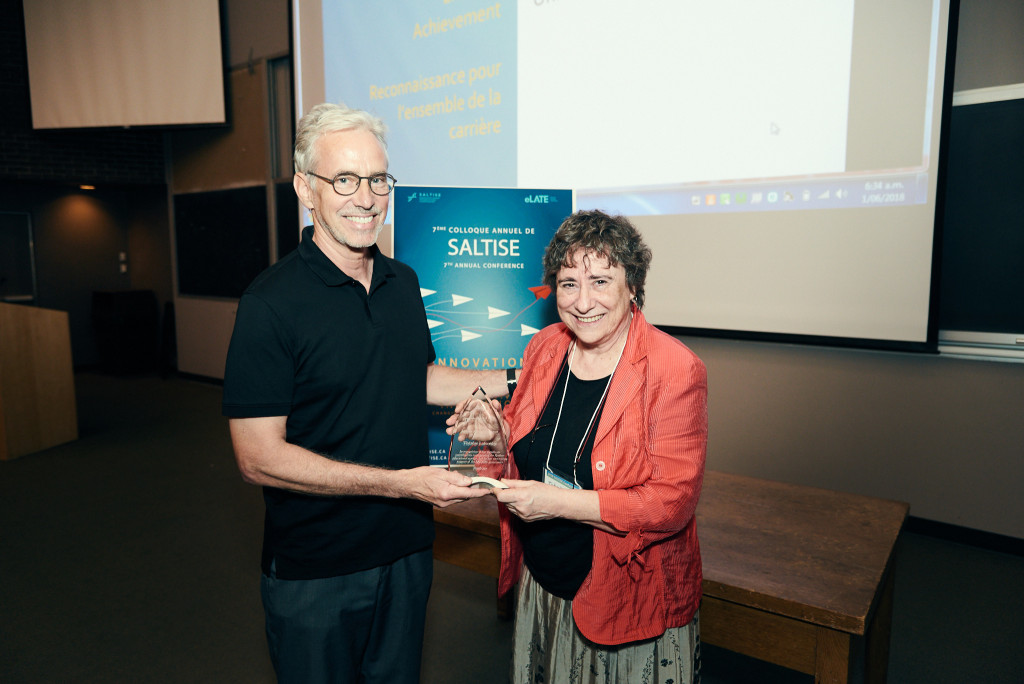
Thérèse Laferrière, from the Université Laval, receives the SALTISE lifetime achievement award (Photo copyright Tom Berthelot)
Afternoon keynote
Traveling all the way from New Zealand for the SALTISE conference, Dr. Paul Denny from the University of Auckland delivered a fascinating talk on his experience developing the PeerWise platform for students. PeerWise allows students “to create and to explain their understanding of course-related assessment questions, and to answer and discuss questions created by their peers.” The platform is in development since 2007 and now contains over 3 million rated questions.
Denny was interested in whether students could create effective questions. According to him, when students define a question they need to reflect on what they are learning in the course and then come up with a set of answer options (perhaps thinking of common misconceptions). The students also put themselves in the place of a teacher to think about what might be evaluated on a test. The final and most important step for students is to write an adequate explanation to the questions they have posted.
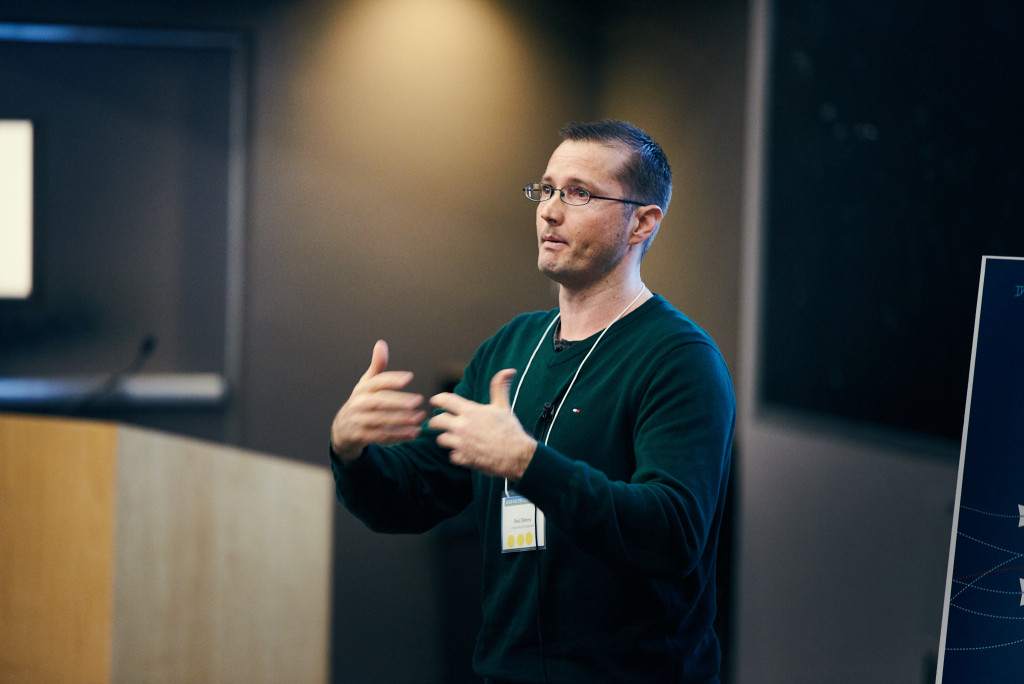
Dr. Paul Denny came all the way from New Zealand to present his talk on the PeerWise question platform (Photo copyright Tom Berthelot).
Denny observed an improvement in exam scores for students who write or answer questions or review how the questions were answered by others. The act of writing question promotes long-term retention and deeper learning.
For more information, you can read publications about the platform here.
Afternoon workshops
Once again in the afternoon, attendees had no shortage of choice, with 7 different thematic blocks of micro-presentations to choose from.
The Ed Tech: Innovation in the Classroom block covered a wide variety of novel approaches and technologies, from gamification to virtual laboratory simulations and virtual reality in the classroom. In this block, Nathalie Duponsel, Ann-Louise Davidson, Bora Bodur from Concordia University provided an interesting talk entitled The Disruptive Social Potential of 3D Printing in Higher Education.
They spoke to skills that students must develop to take part in the 4th Industrial Revolution, namely:
- working collaboratively
- learning independently
- being resourceful; and
- actively applying interdisciplinary knowledge
The presenters then spoke about their research and community projects that entailed building 3D printers in Makerspaces.
Putting technology in the hands of students and getting them to problem-solve as a team helps them to develop the aforementioned skills, and the act of ‘making,’ the presenters told us, is one of empowerment.
For more information on maker activities for educators, you can visit the Education Makers website.
Reception
After a day full of ideas, it was nice to share our favourite parts of the conference at a reception held in the atrium of the Faculty of Education building. SALTISE seized the occasion to announce the winners of the Fall 2018 SALTISE Mini-grants.
But wait, there’s more!
The post conference workshops held at Dawson college on Friday June 1st gave participants the opportunity to work with local and national leaders in active learning. The keynote speakers from the conference transformed their keynotes into experiential workshops where participants’ involvement and engagement with the material were maximised.
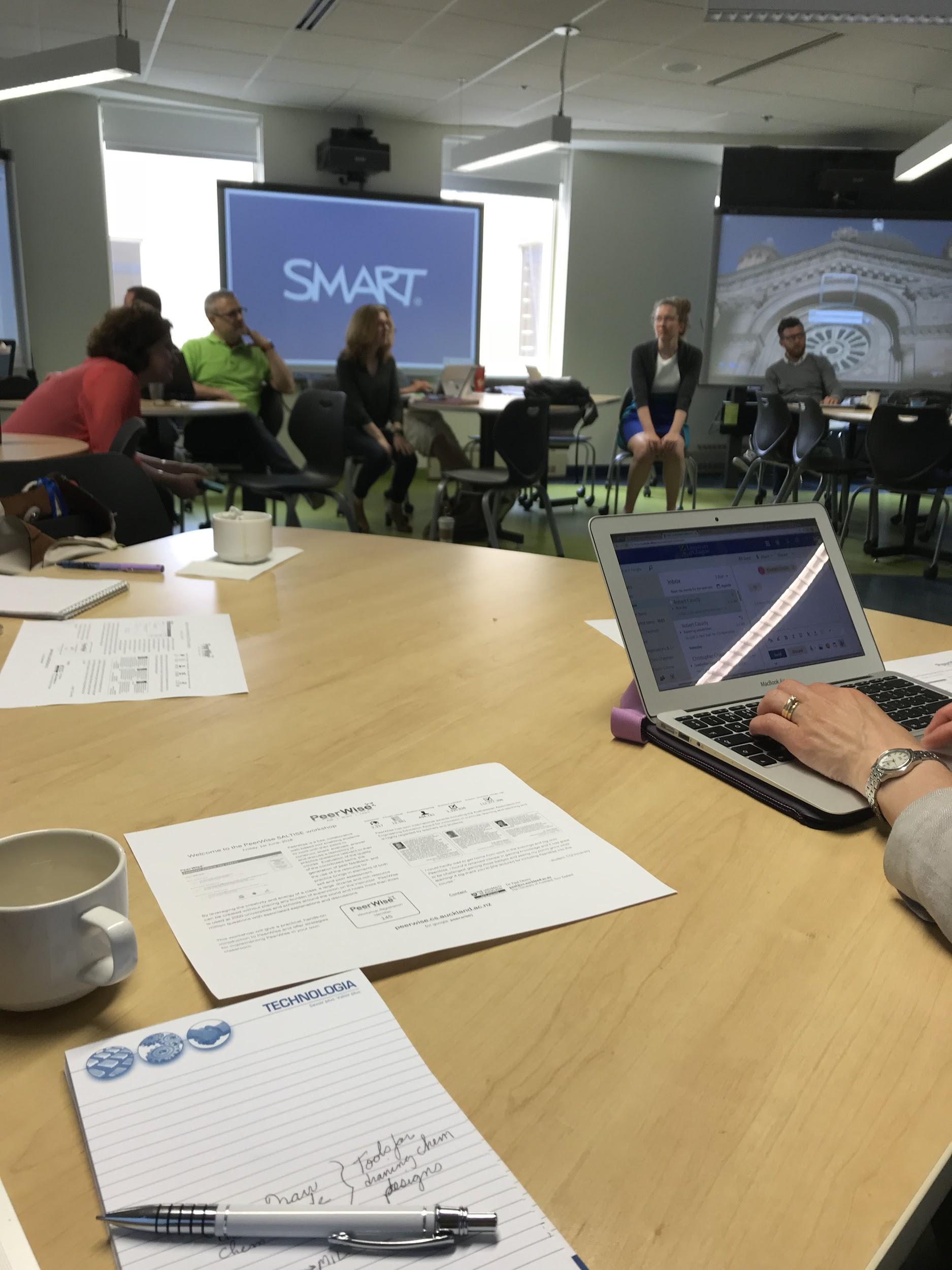
SALTISE post conference workshop in an active learning classroom at Dawson College
The SALTISE website mentions that “Active Learning has become a way to describe the types of instruction and pedagogy that calls for students to participate more fully with the course content” and the enthusiastic SALTISE research assistants, Meghan Marshall, Jeremie Choquette and Veronique Brule applied this principle to their presentation, SALTISE Active Learning Web-Platform Resources: Authentic Active Learning Activities and Strategies for Every Classroom. Indeed, not only did they present the SALTISE active learning web-platform resources, but they actually had participants develop authentic active learning activities and strategies for their own classroom.
Hat’s off to the organizers
The SALTISE 2018 Conference was a great opportunity to share best practices in active learning and network with members of the college and university networks. It was great to see a number of our colleagues from French establishments participate this year.
Congratulations to Myriam Dimanche (SALTISE) and Maria Orjuela-Laverde (McGill, eLATE) the conference co-coordinators, and to all of the SALTISE administrators, members and volunteers for another successful event.
We’re already looking forward to the 2019 edition!

